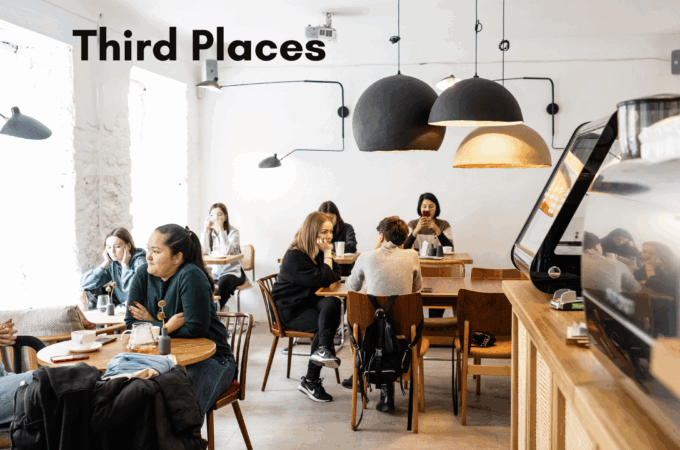One of our family’s favorite things to do in the summer is go to our local outdoor farmer’s market. Local farmers and business owners sell their produce and products there– but we don’t usually buy much, unless we see some good fruits or vegetables we know we will eat, or another consumable product that we use regularly (local maple syrup and small-batch peanut butter are staples in our house!). Most of the time we go just to be outside, interact with our local community, and hear some local musicians.
It wasn’t until I heard about the concept of “third places” that I realized why my family liked our weekend time at the farmer’s market so much.
What are “third places?”
The term “third places” was first used by sociologist Ray Oldenburg in his book The Great Good Place, first published in 1989 (with subsequent published editions, including work from co-author Karen Christensen in the latest 2023 revised edition).
“First places” are our homes– private, domestic space. “Second places” are our workplaces, known for established expectations and structure (sometimes these two spaces are somewhat combined if one works from home).
“Third places” are community-based spaces that are neither private homes nor workplaces. They tend to be relatively easy to get to, focus on conversation and social interaction (usually there are familiar “regulars” or “semi-regulars” around), accessible to a wide range of socio-economic levels (free or inexpensive), and comfortable (people want to stay there a while). Places like cafés/coffee shops, libraries, farmer’s markets, community centers (senior centers, local community/recreation centers, etc.), local parks, religious and/or spiritual gatherings, and barber shops/beauty salons are just a few examples of typical third places.
Some classic examples of third places in mainstream media include the coffee shop Central Perk in the TV show Friends, the bar in the TV show Cheers, and Calvin’s Barbershop in the Barbershop movies.
Why should we care about third places?
Oldenburg (and later, Christensen as well) argue(s) that third places are incredibly important to our well-being as humans. We need spaces to connect with others that are not private residences or focused on work. We especially need places in which everyone is equal, welcomed, and invited to relax, be themselves, and interact with one another.
Loneliness is a constant issue in society today; in a recent study, 21% of adults reported having “serious feelings of loneliness.” Third places help alleviate loneliness and disconnectedness.
You may have noticed that religious/spiritual gatherings can sometimes be a third place; it really depends on the gathering and how open, inviting, and comfortable it truly is. Though most third places tend to be informal in nature, there can also be church communities that participate in more formal worship that also have informal and comfortable community interactions surrounding the worship experience.
Church communities have the potential to be great third places for our communities; places where people can both experience God’s presence in worship and in multi-generational, informal community interactions over food, in Bible study, and during other programs and events.
Third Places and Christian Minimalism
Christian minimalism is a focus on the aspects of life that matter most, and intentionally removing everything else– while also connecting intentional living to Christian faith and spirituality. As followers of Jesus, we are invited to live more deliberately and simply in order to care for others, ourselves, and God’s creation.
One of the aspects of life that matters most are relationships with others. God created us to be in community, and we are best able to be present, ourselves, and interactive in community when we are in comfortable, accessible third places.
And let us consider how we may spur one another on toward love and good deeds, not giving up meeting together, as some are in the habit of doing, but encouraging one another—and all the more as you see the Day approaching
Hebrews 10:24-25
Continuing to establish and provide third spaces in our communities– including churches and other open and welcoming spaces– help us all to focus on what’s most important and build connections and local community, while also countering loneliness and disconnectedness.
What are some third places in your local community? How is God inviting you to be more involved in and/or support these third places?
Did you like this post? Check out the Christian Minimalism book!


1 Comment
Ron
May 6, 2025 - 8:59 pmHi Pastor Ehlrlch
Appreciate your article on Third Places. I recently retired earlier than i had planned to due health issues.
I have many third place options, but have been too depressed to go to them. But when i make the effort to do so, I feel better.
Got my alarm set to go to third places tomorrow.
Thank you